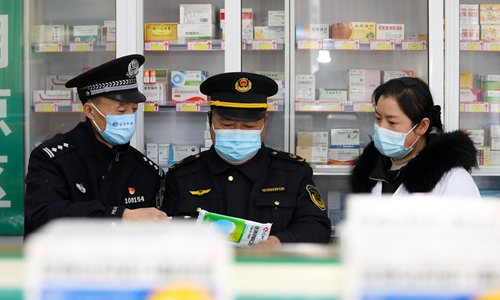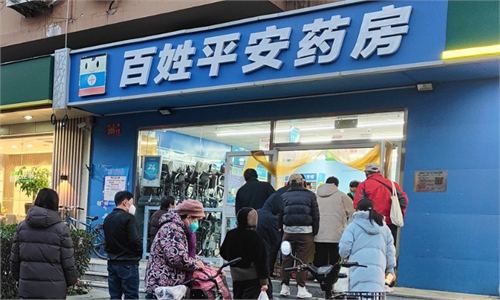Chinese market regulators step up crackdown on price gouging of anti-epidemic products

Officials in East China's Jiangsu Province conduct an on-site inspection of a pharmacy on December 14, 2022. Photo: cnsphoto
Market regulators across China have stepped up crackdown on price hikes for epidemic-related products, in a bid to meet surging demand and protect consumers' legal rights.
East China's Jiangsu Province has conducted inspections at key areas such as superstores, pharmacies and nucleic acid testing sites, and a number of business entities face investigations for inflating the prices of some epidemic-related materials.
In order to guide retailers and ensure compliance, the province's market supervision bureau released a number of typical cases of illegal acts involving epidemic materials. For instance, a pharmacy sold Chinese herbal medicine Lianhua Qingwen at a retail price of 15.3 yuan ($2.19) per box before December, but the highest price has since hit 49.8 yuan per box, surging 225.49 percent.
The province has inspected a total of 16,000 business entities and investigated 32 cases of various violations.
Market regulators in East China's Zhejiang Province also increased supervision of prices of epidemic-related medical products, antigen testing reagents and protective supplies, and announced the first batch of nine typical cases of price inflation on Friday.
For instance, after the market regulator of Zhuji city conducted inspections on an e-commerce company on December 14, regulators found that the actual transaction price of KN95 masks it sold on an e-commerce platform rose from 18.68 yuan per package on December 6 to 139.9 yuan per package on December 14, an increase of up to 648.93 percent.
The market regulator of Beijing's Haidian district on December 12 investigated the first case of overpriced COVID-19 antigen self-testing kits, with a proposed penalty of 300,000 yuan.
In addition, localities also announced a series of illicit cases in which pharmacies forced consumers to buy epidemic-related materials packed with other products.
According to the market regulator from Changchun, Northeast China's Jilin Province, a local pharmacy sold Lianhua Qingwen with compulsory azithromycin or roxithromycin, disguising a significant increase in the price of the capsules.
"During the special period of epidemic prevention and control, it is not enough to rely on the market's own regulation. Only the market regulators can ensure the smooth operation of the market through supervision and management, to further protect the legitimate rights and interests of consumers," Chen Yinjiang, deputy secretary general of the Consumer Protection Law Association of the China Law Society, told the Global Times on Sunday.
Chen added that the announcement of illegal cases can protect the public's right to know, and also remind other drug-related enterprises to operate legally and in compliance with the law.
In order to ensure the public's demand for medical supplies under the new situation of epidemic prevention and control, the State-owned Assets Supervision and Administration Commission of the State Council set up a task force on medical supplies, urging centrally administered enterprises involved in drugs to make every effort to ensure the supply of medical materials, the Xinhua News Agency reported on Saturday.
Sinopharm has deployed more than 160 pharmaceutical enterprises to ensure supply and increase production, and the production capacity of key products for epidemic prevention and control has been expanded to three times the daily capacity, while large quantities have been put into retail terminals.
"Enterprises should assume social responsibility, while consumers should be rational in their consumption and use epidemic prevention supplies scientifically and reasonably," Chen said.

